| Collection: | Stonefalls Lore |
| Location(s): | Stonefalls |
| Location Notes: | Southeastern Central part of Stonefalls, Southwest from Othrenis Wayshrine, East from Fort Arand Waysrhine. On red edge of a tiny carpet, bellow small tent, next to an extinguished camp fire. |
| Image walkthrough: | |
| Map: | 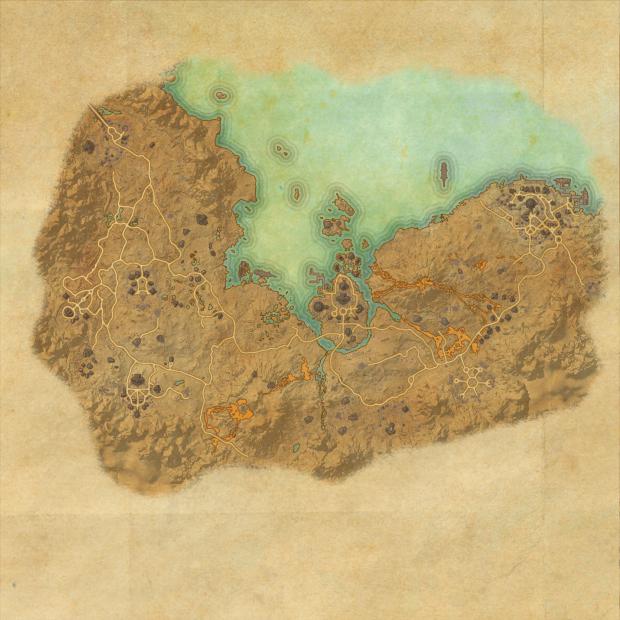 |
Lorebook text
The departed spirits of the Dunmeri, and perhaps those of all races, persist after death. The knowledge and power of departed ancestors benefit the bloodlines of Dunmeri Houses. The bond that forms between living family members and their immortal ancestors is partly blood, partly ritual, partly volitional. Anyone brought into a house through marriage is bound through ritual and oath into the clan, gaining communication and benefits from the clan’s ancestors; however, his access to the ancestors is less than that of his offspring, and he still retains some access to the ancestors of his own bloodline.
The Family Shrine
Each residence has a family shrine. In poorer homes, it may be no more than a hearth or alcove where family relics are displayed and venerated. In wealthy homes, a room is set aside for the use of the ancestors. This shrine is called the Waiting Door, and represents the door to Oblivion.
Here the family members pay their respects to their ancestors through sacrifice and prayer, through oaths sworn upon duties, and through reports on the affairs of the family. In return, the family may receive information, training, and blessings from the family’s ancestors. The ancestors are thus the protectors of the home, and especially the precincts of the Waiting Door.
The Mortal Chill
Spirits do not like to visit the mortal world, and they do so only out of duty and obligation. Spirits tell us that the otherworld is more pleasant, or at least more comfortable for spirits than our real world, which is cold, bitter, and full of pain and loss.
Mad Spirits
Spirits that are forced to remain in our world against their will may become mad spirits, or ghosts. Some spirits are bound to this world because of some terrible circumstances of their death, or because of some powerful emotional bond to a person, place, or thing. These are called hauntings.
Some spirits are captured and bound to enchanted items by wizards. If the binding is involuntary, the spirit usually goes mad. A willing spirit may or may not retain its sanity, depending on the strength of the spirit and the wisdom of the enchanter.
Some spirits are bound against their wills to protect family shrines. This unpleasant fate is reserved for those who have not served the family faithfully in life. Dutiful and honorable ancestral spirits often aid in the capture and binding of wayward spirits.
These spirits usually go mad, and make terrifying guardians. They are ritually prevented from harming mortals of their clans, but that does not necessary discourage them from mischievous or peevish behavior. They are exceedingly dangerous for intruders. At the same time, if an intruder can penetrate the spirit’s madness and play upon the spirit’s resentment of his own clan, the angry spirits may be manipulated.
Oblivion
The existence of Oblivion is acknowledged by all Tamriel cultures, but there is little agreement on the nature of that otherworld, other than it is the place where the Daedra live, and that communication and travel are possible between this world and Oblivion through magic and ritual.
The Dunmer do not emphasize the distinction between this world and Oblivion as do the human cultures of Tamriel. They regard our world and the otherworld as a whole with many paths from one end to the other rather than two separate worlds of different natures with distinct borders. This philosophical viewpoint may account for the greater affinity of Elves for magic and its practices.
Foreign Views of Dunmeri Ancestor Worship and Spirit Magic
The Altmeri and Bosmeri cultures also venerate their ancestors, but only by respecting the orderly and blissful passage of these spirits from this world to the next. That is, Wood Elves and High Elves believe it is cruel and unnatural to encourage the spirits of the dead to linger in our world. Even more grotesque and repugnant is the display of the bodily remains of ancestors in ghost fences and ash pits. The presentation of fingerbones in a family shrine, for example, is sacrilegious to the Bosmer (who eat their dead) and barbaric to the Altmer (who inter the ashes of their dead).
The human cultures of Tamriel are ignorant and fearful of Dark Elves and their culture, considering them to be inhuman and evil, like Orcs and Argonians, but more sophisticated. The human populations of Tamriel associate Dunmeri ancestor worship and spirit magic with necromancy; in fact, this association of the Dark Elves with necromancy is at least partly responsible for the dark reputation of Dunmer throughout Tamriel. This is generally an ignorant misconception, for necromancy outside the acceptable clan rituals is a most abhorrent abomination in the eyes of the Dunmer.
The Dark Elves would never think of practicing sorcerous necromancy upon any Dark Elf or upon the remains of any Elf. However, Dark Elves consider the human and Orcish races to be little more than animals. There is no injunction against necromancy upon such remains, or on the remains of any animal, bird, or insect.

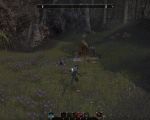
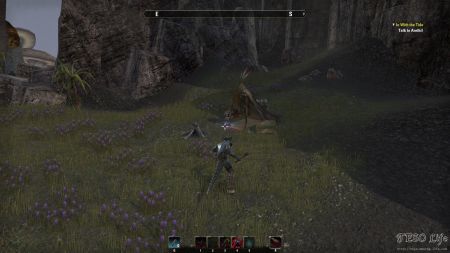
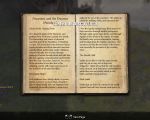
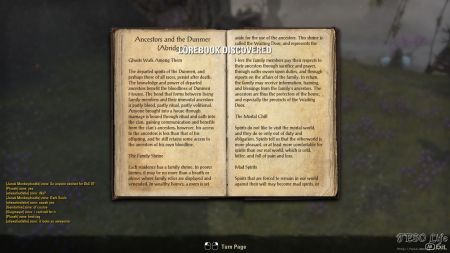
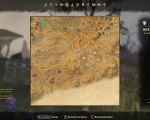
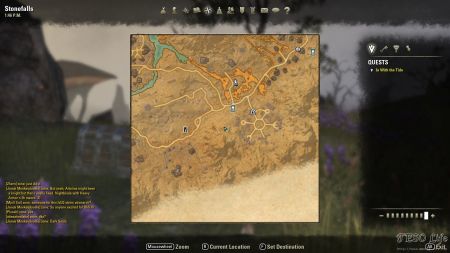
Found another one in Othrenis, to the left side of the pillars of light, behind a stone monument